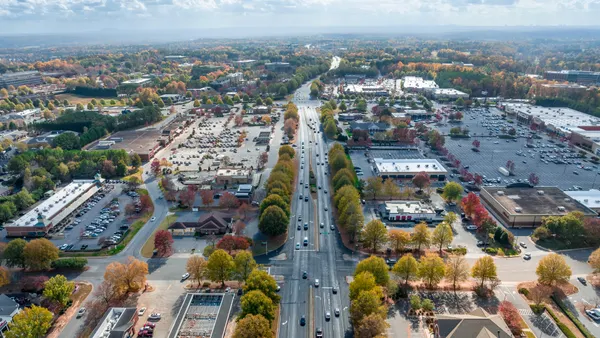Dive Brief:
- Wells Fargo is donating the roughly $400 million it has taken in Paycheck Protection Program (PPP) loan processing fees — funneling the money through its Open for Business Fund to nonprofit organizations helping small businesses, especially Black-owned ones, recover from the coronavirus, the bank said Thursday.
- The fund is accepting applications from community development financial institutions (CDFIs) and special-purpose funds formed by CDFIs until Aug. 7, with future grant cycles set for later in the year.
- The nation’s biggest banks took flak during PPP’s earliest days for allegedly prioritizing larger loans — for the larger fees attached. Since then, all of the four largest lenders have vowed to donate PPP fee money. However, Wells is the only bank of its size to donate gross processing fees — not just the net profit, the portion exceeding costs.
Dive Insight:
PPP processing fees have re-emerged as a hot-button topic since the Small Business Administration disclosed a list of PPP loan recipients Monday.
JPMorgan Chase is on track to make $864 million in fees off the industry-leading $28.8 billion in loans it facilitated through the program, according to an S&P Global analysis published Tuesday. Bank of America, which ranked second, is set to make $755 million from PPP loan fees, according to the data.
Wells Fargo ranked fifth, behind PNC and Truist. The San Francisco-based lender funded $10.1 billion in PPP loans for more than 179,000 customers, it said Thursday.
"By donating approximately $400 million in processing fees to assist small businesses in need, Wells Fargo’s Open for Business Fund creates opportunities for near-term access to capital and addresses the road ahead to meaningful economic recovery, especially for Black and African American entrepreneurs and other minority-owned businesses," CEO Charlie Scharf said in a press release. "Wells Fargo is committed to helping small businesses impacted by COVID-19 stay open and get back to growth."
The disparate impact of the pandemic on Black- and Latino-owned businesses has also come into focus as the crisis deepened. A June report from the National Bureau of Economic Research found COVID-related conditions eliminated 41% of Black small-business owners between February and April, compared with a 36% drop for immigrant-owned businesses; 32% among Hispanics; and 25% among women.
Wells isn’t the first big bank to lay out a CDFI-related plan for PPP processing fees. Citi said last week it would donate $25 million from its fees to support CDFIs, adding that that figure could change.
Bank of America said in May that its PPP profits would be used to "support small businesses and the communities and nonprofits we serve," but it hasn’t released further details, according to The New York Times.
PPP fees aren’t delivered to banks until borrowers’ loans are forgiven, a process that could take months.
Wells said the Open Business Fund is a three-year effort, but much of the money will be distributed by January, according to American Banker. The bank said it has already chosen two initial grantees: Expanding Black Business Credit Initiative, which aims to close the racial wealth gap in Black communities; and the Local Initiatives Support Corp., which will provide grants and low-cost capital to more than 2,800 entrepreneurs.
Several banks, payment companies and big-name corporations such as Bank of America, PNC, U.S. Bank, PayPal and Netflix have pledged billions of dollars collectively over the past month or so to narrow the racial wealth gap.










